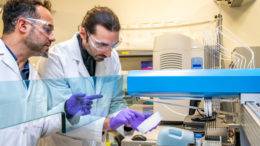- Despite increasing digitization and smart technologies, data has emerged as a critical business asset. Companies must leverage massive amounts of data, use analytics, and develop cutting-edge technologies to remain competitive.
- Data science has the potential to transform the healthcare sector in numerous ways.
- Data analysis supports a value-based, data-driven approach in everything from health tracking to scheduling nursing shifts.
- This, in turn, optimizes the workforce and throughput, improves care recipient satisfaction, and balances the supply.
- Furthermore, by implementing the proper use of data science in healthcare, medical organizations can drastically reduce costs and readmissions.
- Data can transform businesses. It’s no surprise that the global market for Big Data as a Service is expanding.
Why data science will continue to be a prominent part of the technology landscape are as follows:
The massive increase in data:
- In recent years, the amount of data generated by individuals, businesses, and various digital devices has increased exponentially.
- This data is a valuable resource that, when properly utilized, can provide valuable insights, improve decision-making, and drive innovation across a variety of industries.
BI and Making the Right Decisions:
- With data science, organizations can find patterns, trends, and associations by analyzing large quantities of data, which allows them to make wise business decisions by analyzing trends and associations.
- Increasing the competitive edge of a company can be achieved by making wise decisions and optimizing the company’s operations.
- These types of statistics are extremely helpful in helping organizations achieve this goal.
Data Science and Artificial Intelligence:
- Inextricably linked together are data science, artificial intelligence (AI), and machine learning (ML). By using data in a machine learning algorithm, you can gain insight into your experience and improve your performance over time.
- Increasingly, AI is being employed in several varied fields, and data science plays a valuable role in both training and refining AI models as they become more prevalent.
Personalization and Customer Experience:
- Data science enables businesses to personalize products, services, and user experiences based on individual preferences and behaviors.
- Personalization increases customer engagement and loyalty.
Automation and efficiency:
- Using data science techniques, businesses can automate repetitive tasks, optimize processes, and improve overall efficiency, resulting in cost savings and increased productivity.
Healthcare and Biotechnology:
- Data science is transforming medical research, drug development, and patient care in the healthcare industry.
- Large-scale dataset analysis helps discover disease patterns, potential treatments, and personalized medicine options.
Internet of Things (IoT):
- The proliferation of IoT devices has resulted in massive data generation.
- Data science is critical for gaining meaningful insights from this data and making IoT devices smarter and more useful.
Predictive Analytics:
- Data science enables predictive analytics, which helps businesses anticipate future trends, customer behavior, and potential risks.
- This foresight aids in risk mitigation and proactive decision-making.
Financial Analysis and Counterfeiting Detection:
- Data science is critical for analyzing financial data, spotting illicit behavior, and determining optimum investment approaches
Social networking consequences:
- Data science has the potential to address societal challenges such as poverty, climate change, and healthcare disparities by analyzing data to discover problems and propose data-driven solutions.
Given the ongoing advancement of technology and the ever-increasing volume of data generated, data science is likely to remain a significant and evolving field.
Its application spans multiple domains, and its impact on businesses and society is expected to last for many years.
The Data Science programs at Sollers College were designed with the burgeoning need for trained data analysts in mind. Algorithms, mathematical concepts, statistics, programming in R, AWS, and Python, data visualization using Tableau, modeling and prediction, information and text analytics, machine learning, NLP, and deep learning using Python are the main topics of the programs.
It is Sollers‘ goal to create programs that are tailored to the needs of the industry, and this is the biggest reason why students choose to study here. The career service advisors at the Data Science Center are industry professionals who assist students with resume writing and interview practice to prepare them for careers in data science.









